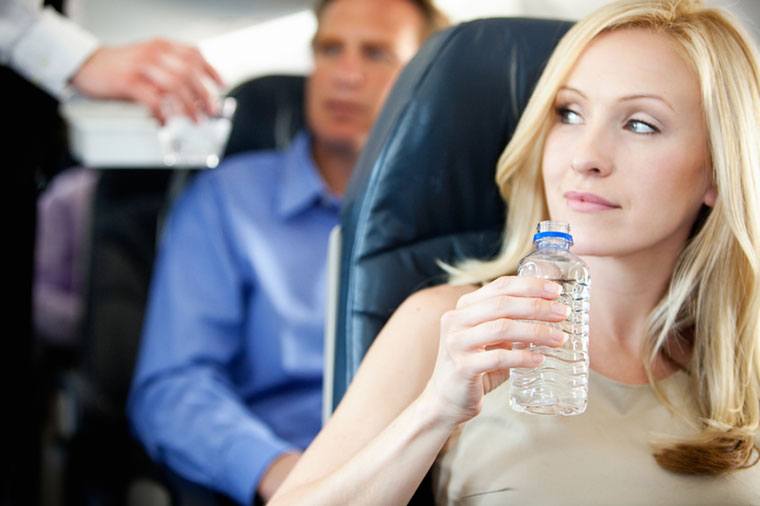4 Ways to Fall Asleep on a Plane Without Popping Pills
For those who can’t sleep on planes, the prospect of spending several hours wide awake is enough to make most reach for a quick way to conk out. The most likely suspects? Booze or sleeping pills. But both are a bad idea, according to Dr. Jamie Zeitzer, a sleep expert at the Stanford Center for Sleep Sciences and Medicine and assistant professor of psychiatry and behavioral science at Stanford University. While, say, a glass of merlot might offer a quick fix, the resulting downtime it produces is less than ideal.
Plane cabins are cramped, noisy, smelly, and often stressful spaces—not exactly the ideal conditions for getting a good night's zzz's.
Here's why: When you're dozing thanks to either option, he explains, “your normal sleep processes aren't fully active." Plus, your five-hour flight might not be enough time to metabolize a drug that’s meant stay in your system for eight hours—hence the hungover feeling you could have as you try to find your Lyft at your destination. Dr. Zeitzer points out that even gentler nutraceuticals, like melatonin, can be problematic; data to support their use is insufficient, and they're unregulated by the FDA and often come in doses far higher than the physiologic concentrations used in studies.
So, what to reach for when you're on a red eye? The fact is, there's very rarely a one-size-fits-all approach to dealing with sleep issues (whether you're on the ground or in the air). What works for someone else may not work for you—and the hack that helped you doze off last flight might not have the same effect this time around. That being said, there are a few super-simple tips that can up your chances of powering down on a plane.
Here are 4 things Dr. Zeitzer says to try in-flight when you can't fall asleep.

1. Hydrate properly. It should come as no shocker that planes are extremely dehydrating—so in general, making sure you're drinking up is crucial. (Sadly, Bloody Marys don't count.) But it also impacts your sleep, since you won't be woken by your dry mouth. (Yes, that's a thing.) BYO bottle to fill up before you board the plane, splurge on that extra-large bottle of water, or—pro tip—just ask a flight attendant for refills on the reg.

{{post.sponsorText}}
2. Use an eye mask. Light can directly increase how awake you are, and plenty of light (about 10–15 percent) can pass through your closed eyelids. Using an eye mask can help reduce the impact of lighting on your brain—and also sends a signal to your chatty seatmate that you're not in the mood to talk.
3. Try to time your flight or nap to coincide with your internal clock. The circadian clock makes it very difficult to sleep at specific times of day, notably in the hours just before your normal bedtime. Try to schedule your flight—or your nap on a long flight—late enough that you aren’t trying to sleep during the wrong window. Scheduling early-morning flights that force you to get up earlier than usual will also increase your ability to sleep on the plane (and might help you beat the security lines, while you're at it).
4. Relax. That’s easier said than done, of course, but find what relaxes you—and then figure out a way to bring it into your small, chair-sized space. Read a book, do a crossword, play a game, meditate, listen to music, watch one of the random movies they're screening on the in-flight entertainment system—whatever calms you down (or at the very least, makes the flight more pleasant). It might sound counterintuitive, but no good sleeper ever tries to sleep.
If you need a new book for your next flight, here are 10 life-changing picks from wellness influencers and the travel memoir being dubbed the next "Wild".
This story was originally published on June 1, 2017; it was updated on August 13, 2018.
Loading More Posts...